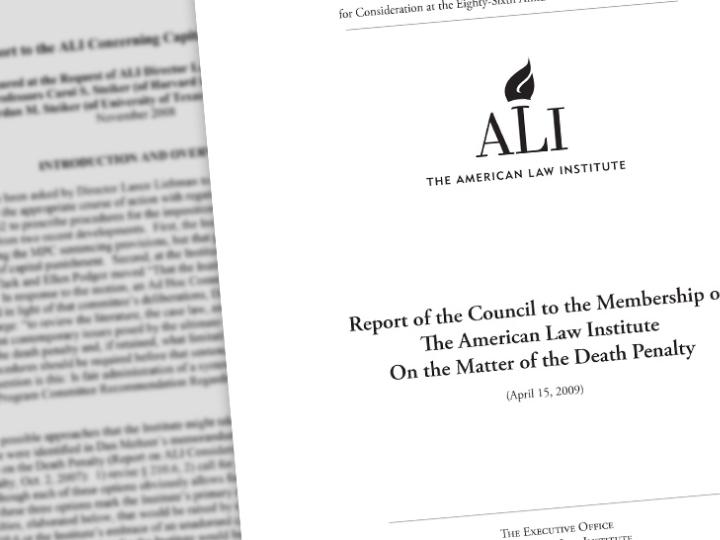The Connecticut Supreme Court ruled Thursday (August 13, 2015) that executing inmates on the state’s death row would violate the constitution of Connecticut, effectively striking down the death penalty in that state. This decision comes three years after Connecticut abolished capital punishment, but left death sentences intact for inmates already on death row; see Public Acts 2012, No. 12-5 (P.A. 12-5).
In its decision, the court relied heavily on The American Law Institute’s report on the death penalty. The 2009 study, Report to the ALI Concerning Capital Punishment, was completed by Carol Steiker of Harvard Law School and Jordan Steiker of The University of Texas School of Law. The report led to The American Law Institute’s vote to withdraw the capital punishment provisions in the Model Penal Code.
In support of the decision, the opinion cited declining death penalty use across most jurisdictions, as found in the 2009 study:
Even within those jurisdictions where it remains legal, ‘‘use of the death penalty (in terms of executions and especially death sentences) has declined significantly in recent years.’’ C. Steiker & J. Steiker, Report to the American Law Institute Concerning Capital Punishment, in A.L.I., Report of the Council to the Membership of the American Law Institute on the Matter of the Death Penalty (April 15, 2009) annex B, p. 2. The total number of executions carried out nationally has fallen by more than 60 percent from the post-Furman peak of 1999, dropping from 98 in 1999 to 39 in 2013, and then falling again to 35—a 20 year low—in 2014.70 Of the 35 executions carried out in 2014, approximately 90 percent occurred in just four states: Texas, Missouri, Florida, and Oklahoma.
The opinion also cited the conclusions reached by the ALI study:
During the hearings on P.A. 12-5, the legislature heard testimony that, following a two year study commissioned by the American Law Institute, unequivocal conclusions were reached regarding the modern death penalty: ‘‘[A] review of the unsuccessful efforts to constitutionally regulate the death penalty, the difficulties that continue to undermine its administration, and the structural and institutional obstacles to curing those ills forms the basis of our recommendation to the [American Law] Institute. The [long-standing] recognition of these underlying defects in the capital justice process, the inability of extensive constitutional regulation to redress those defects, and the immense structural barriers to meaningful improvement all counsel strongly against the Institute’s undertaking a law reform project on capital punishment, either in the form of a new draft of § 210.6 or a more extensive set of proposals. Rather, these conditions strongly suggest that the Institute recognize that the preconditions for an adequately administered regime of capital punishment do not currently exist and cannot reasonably be expected to be achieved.’’
Read the full opinion online.
Read the 2009 “Report of the Council to the Membership of The American Law Institute On the Matter of the Death Penalty.”
